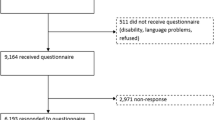Abstract
We introduce the English language version of a scale of subjective well-being that has proved reliable, valid, sensitive to change, and well suited to research on clinical populations in France. The Internal consistency of both versions exceeds 0.80 and the data suggest that they are equivalent in meaning. In a comparative study of normal samples, American subjects scored significantly higher than French; the difference was greater for women than for men. Young French women in particular had lower scores, a finding interpreted in terms of contemporary socioeconomic circumstances. We conclude that the two versions of the scale are useful for both within and cross-national research.
Similar content being viewed by others
References
Hollandsworth JG. Evaluating the impact of medical treatment on the quality of life: a 5-year update. Soc Sci Med 1988; 26: 425–434.
Patrick DL, Deyo RA. Generic and disease-specific measures in assessing health and quality of life. Med Care 1989; 27 (suppl): 217–232.
Dimenäs ES, Wiklund IK, Dahlöf CG, Lindvall KG, Olofsson BK, DeFaire UH. Differences in the subjective well-being and symptoms of normotensives, borderline hypertensives and hypertensives. J Hypertension 1989; 7: 885–890.
Hyland ME, Finnis S, Irvine SH. A scale for assessing quality of life in adult asthma sufferers. J Psychosom Res 1991; 35: 99–110.
Fitzpatrick R, Ziebland S, Jenkinson C, Mowat A. A generic health status instrument in the assessment of rheumatoid arthritis. Br J Rheumatol 1992; 31: 87–90.
Payne SA. A study of quality of life in cancer patients receiving palliative chemotherapy. Soc Sci Med 1992; 35: 1505–1509.
Fletcher A, Bulpitt CJ. Assessment of quality of life in clinical trials of cardiovascular disease. J Chronic Dis 1987; 40: 557.
Siegrist J, Junge A. Conceptual and methodological problems in research on the quality of life in clinical medicine. Soc Sci Med 1989; 29: 463–468.
Hunt SM. Measuring Health Status. London: Croom Helm, 1986.
Croog SH, Levine S, Testa MA, et al. The effects of antihypertensive therapy on the quality of life. New Engl J Med 1986; 314: 1657.
Aaronson NK, Bullinger M, Ahmedzai SA. Modular approach to quality of life assessment in cancer trials. Rec Results Cancer Res 1988; III: 231.
Bradburn NM. The Structure of Psychological Well-being. Chicago: Aldine, 1969.
Diener E. Subjective well-being. Psychol Bull 1984; 95: 542–575.
Larson RJ, Diener E, Emmons RA. An evaluation of well-being measures. Soc Indicators Res 1985; 17: 1–17.
Ryff CD. Happiness is everything, or is it? Explorations of the meaning of psychological well-being. J Pers Soc Psychol 1989; 57: 1069–1081.
Gill WM. Subjective well-being: properties of an instrument for measuring this (in the chronically ill). Soc Sci Med 1984; 18: 683–691.
Perrudet-Badoux A, Mendelsohn G, Chiche J. Développement et validation d'une échelle pour l'évaluation subjective du “Bien-être”. Cah Anthropol Biomét Hum 1988; V: 121–134.
Badoux A, Chiche J, Duchanel D, Raveau F. Evaluation du bien-être de sujets hypertendus avant et après traitement. Presse Méd 1994; 23: 69–72.
Badoux A, Guinnepain MT, Duchanel D. Les facteurs psycho-sociaux dans les urticaires chroniques. Rev Fr Allergol 1991; 31: 105–109.
Badoux A, deLannurien-Thomas A, Duchanel D. ‘Je perds la mémoire’: symptôme écran ou réalité? Cah Anthropol Biomét Hum 1993; XI: 191–202.
Badoux A, Chiche J, Duchanel D, Raveau F. L'isolement social: ses conséquences psychopathologiques. Psychol Méd 1992; 24: 58–62.
Derogatis LR, Melisaratos N. The Brief Symptom Inventory. Psychol Med 1983; 13: 595–605.
Author information
Authors and Affiliations
Rights and permissions
About this article
Cite this article
Badoux, A., Mendelsohn, G.A. Subjective well-being in French and American samples: scale development and comparative data. Qual Life Res 3, 395–401 (1994). https://doi.org/10.1007/BF00435391
Received:
Accepted:
Issue Date:
DOI: https://doi.org/10.1007/BF00435391




